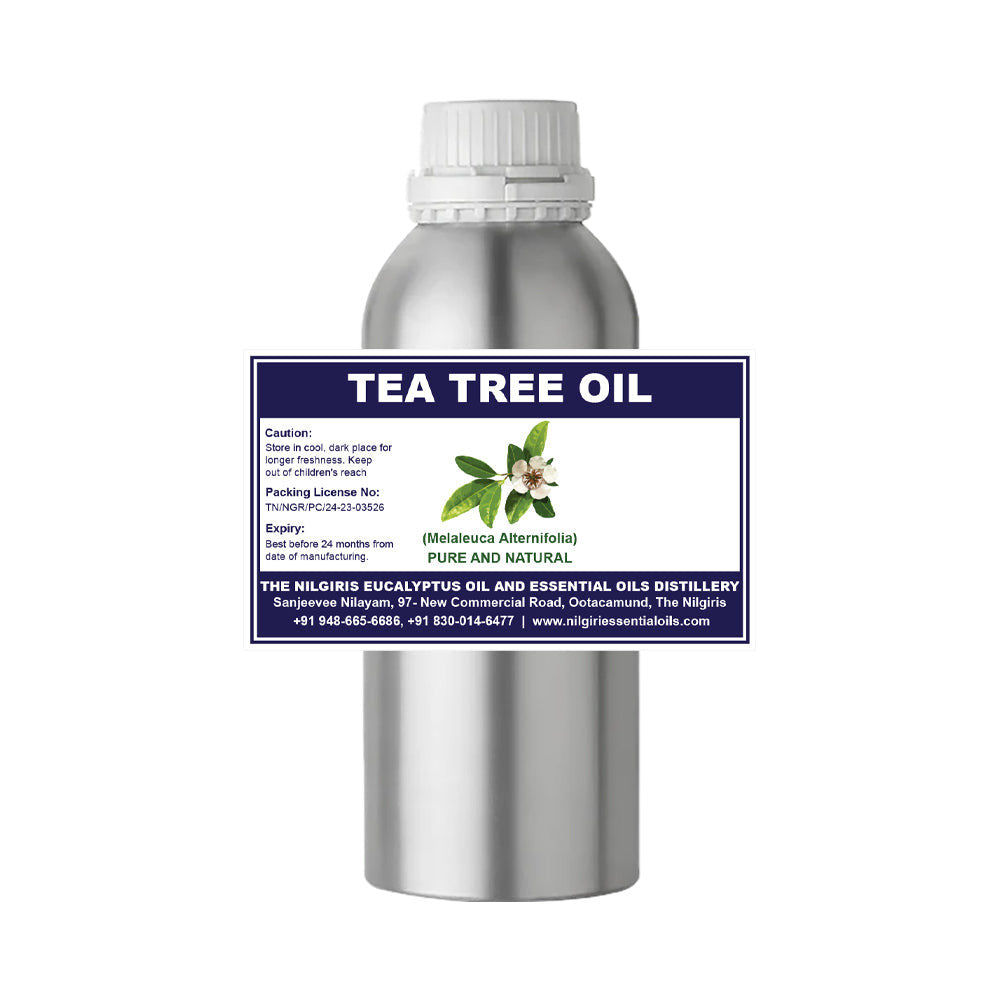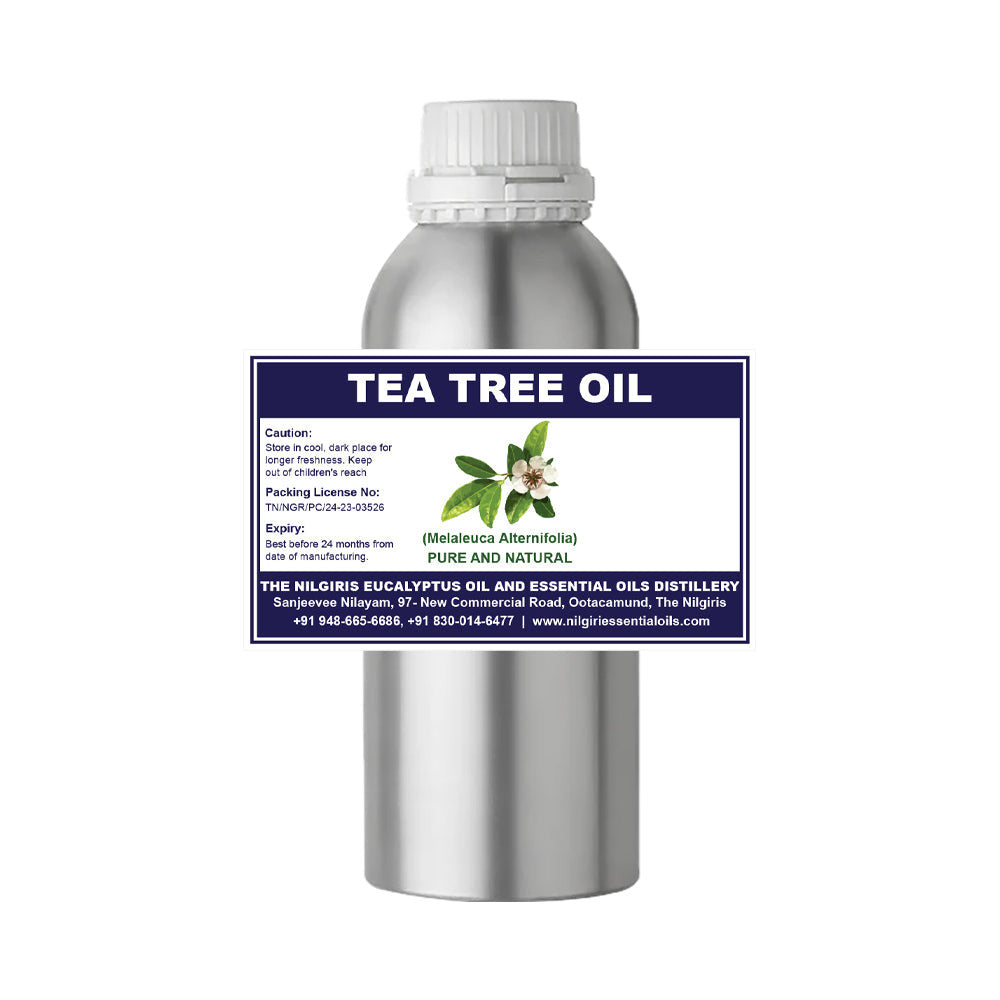Description
Tea tree oil, also known as melaleuca oil, is an essential oil derived from the leaves of the Melaleuca alternifolia tree, native to Australia. It has a pale yellow to clear color and a distinctive medicinal aroma. Tea tree oil is renowned for its powerful antimicrobial, antiseptic, and anti-inflammatory properties, making it a popular ingredient in skincare, hair care, and natural remedies.
Benefits:
-
Antimicrobial Properties: Tea tree oil is highly effective against a wide range of bacteria, viruses, and fungi. It can help kill harmful bacteria on the skin, preventing infections and promoting wound healing. Tea tree oil is often used to treat acne, cuts, scrapes, insect bites, and fungal infections such as athlete's foot and nail fungus.
-
Acne Treatment: Tea tree oil is a popular natural remedy for acne due to its antibacterial and anti-inflammatory properties. It helps reduce acne-causing bacteria on the skin and soothes inflammation, leading to clearer and healthier-looking skin. Tea tree oil can be applied topically to acne-prone areas or diluted with a carrier oil for sensitive skin.
-
Scalp Health: Tea tree oil is beneficial for maintaining a healthy scalp and promoting hair growth. It helps remove excess oil, dead skin cells, and product buildup from the scalp, preventing dandruff and itchiness. Tea tree oil can be added to shampoos or diluted with a carrier oil and massaged into the scalp to improve scalp health and stimulate hair follicles.
-
Skin Conditions: Tea tree oil is effective in treating various skin conditions such as eczema, psoriasis, and dermatitis. Its anti-inflammatory properties help reduce redness, itching, and irritation associated with these conditions, providing relief and promoting skin healing. Tea tree oil can be diluted with a carrier oil and applied topically to affected areas.
-
Household Cleaner: Tea tree oil is a natural disinfectant and can be used to clean and sanitize household surfaces. It helps kill bacteria, mold, and mildew, making it ideal for cleaning bathrooms, kitchens, and other areas prone to germs. Add a few drops of tea tree oil to water in a spray bottle and use it to clean countertops, sinks, and floors.
How to Use:
-
Topical Application: Dilute tea tree oil with a carrier oil such as coconut oil, jojoba oil, or almond oil before applying it to the skin. Apply a small amount of diluted tea tree oil to the affected area using a cotton swab or clean fingertips. For acne, apply directly to blemishes or add a few drops to your regular skincare products.
-
Scalp Treatment: Add a few drops of tea tree oil to your shampoo or conditioner and mix well. Use the infused shampoo or conditioner as usual to cleanse and nourish your hair and scalp. Alternatively, dilute tea tree oil with a carrier oil and massage it into the scalp before shampooing to treat dandruff and promote scalp health.
-
Steam Inhalation: Add a few drops of tea tree oil to a bowl of hot water and inhale the steam to help relieve respiratory congestion and clear nasal passages. Cover your head with a towel and lean over the bowl, keeping your eyes closed, and inhale deeply for several minutes.
-
Household Cleaner: Mix tea tree oil with water in a spray bottle to create a natural household cleaner. Use the solution to clean and disinfect countertops, sinks, toilets, and other surfaces. You can also add tea tree oil to laundry detergent to help sanitize clothes and eliminate odors.
-
Aromatherapy: Add a few drops of tea tree oil to a diffuser or aroma lamp and diffuse it in the air to purify and freshen indoor air. Tea tree oil has a refreshing and invigorating aroma that can help uplift the mood and promote a sense of cleanliness and well-being.
Always perform a patch test before using any essential oils or carrier oils on your skin to check for any allergic reactions. Additionally, pregnant or nursing women and those with certain medical conditions should consult a healthcare professional before using essential oils and carrier oils.
Bottle Size & Packing

30 ml
Glass

30 ml
Aluminium

150 ml to 1 Litre
Aluminium

5 Litres / Kgs
HDPE Can

35 Litres / Kgs
HDPE Can

200 Litres / 180 Kgs
GI Barrel


